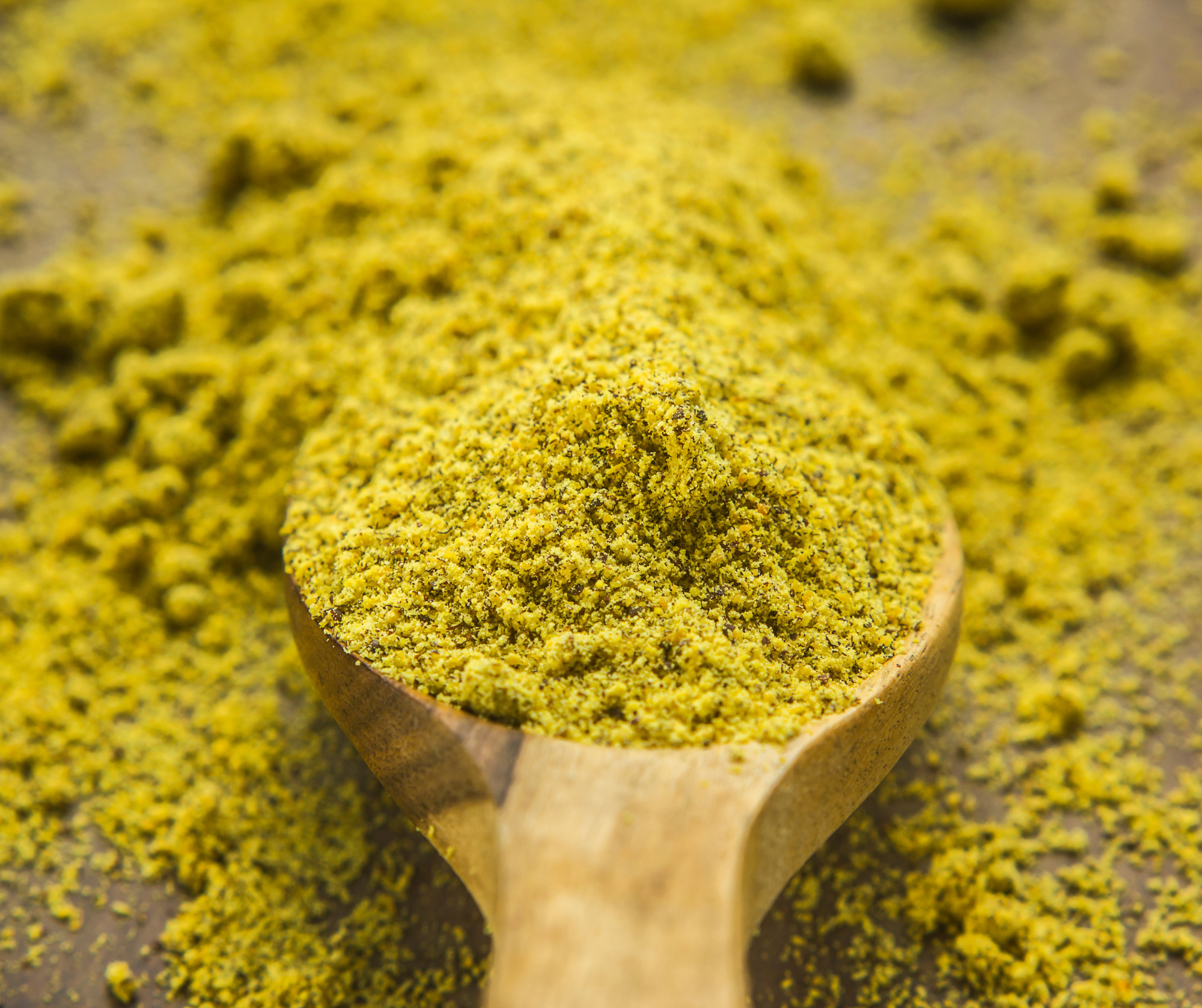Mustard, Powder 2.5 oz
Mustard powder is made from finely ground mustard seeds, and it has a pungent and slightly spicy flavor. It is a versatile spice that is used in various culinary applications to add depth and tangy heat to dishes. Here are some common uses for mustard powder:
Condiments: Mustard powder is a primary ingredient in making prepared mustard, such as yellow mustard, Dijon mustard, and brown mustard. When mixed with water, vinegar, or other liquids, it forms a thick paste with a distinctive flavor.
Marinades: Mustard powder can be included in marinades for meats, poultry, and fish. It not only adds flavor but also acts as a natural tenderizer.
Sauces: It is used in a variety of sauces, including barbecue sauce, salad dressings, and creamy sauces. Mustard powder contributes a tangy kick to the sauce.
Pickling: Mustard powder is a common ingredient in pickling recipes, particularly for pickled vegetables like cucumbers, cauliflower, and green beans. It helps create a zesty and flavorful brine.
Dry Rubs: Mustard powder is part of many dry rubs and spice blends for seasoning meats, especially pork and beef. It helps create a flavorful crust when the meat is grilled or roasted.
Baking: Mustard powder can be used in baking recipes to add a unique and subtle spiciness. It's sometimes added to bread, pretzels, or biscuits to enhance their flavor.
Potato Dishes: Mustard powder is often used to season potato dishes, including mashed potatoes, potato salad, and roasted potatoes. It pairs well with the starchy and creamy nature of potatoes.
Homemade Mayonnaise: Some homemade mayonnaise recipes include a touch of mustard powder to give the mayonnaise a hint of spiciness and complexity.
Sausage-Making: Mustard powder is a traditional ingredient in sausage-making, especially in recipes for bratwurst and other sausages. It contributes flavor and acts as a binding agent.
Flavoring for Eggs: Mustard powder can be added to scrambled eggs, omelets, and deviled egg fillings to provide a tangy and zesty note.
Mustard powder is made from finely ground mustard seeds, and it has a pungent and slightly spicy flavor. It is a versatile spice that is used in various culinary applications to add depth and tangy heat to dishes. Here are some common uses for mustard powder:
Condiments: Mustard powder is a primary ingredient in making prepared mustard, such as yellow mustard, Dijon mustard, and brown mustard. When mixed with water, vinegar, or other liquids, it forms a thick paste with a distinctive flavor.
Marinades: Mustard powder can be included in marinades for meats, poultry, and fish. It not only adds flavor but also acts as a natural tenderizer.
Sauces: It is used in a variety of sauces, including barbecue sauce, salad dressings, and creamy sauces. Mustard powder contributes a tangy kick to the sauce.
Pickling: Mustard powder is a common ingredient in pickling recipes, particularly for pickled vegetables like cucumbers, cauliflower, and green beans. It helps create a zesty and flavorful brine.
Dry Rubs: Mustard powder is part of many dry rubs and spice blends for seasoning meats, especially pork and beef. It helps create a flavorful crust when the meat is grilled or roasted.
Baking: Mustard powder can be used in baking recipes to add a unique and subtle spiciness. It's sometimes added to bread, pretzels, or biscuits to enhance their flavor.
Potato Dishes: Mustard powder is often used to season potato dishes, including mashed potatoes, potato salad, and roasted potatoes. It pairs well with the starchy and creamy nature of potatoes.
Homemade Mayonnaise: Some homemade mayonnaise recipes include a touch of mustard powder to give the mayonnaise a hint of spiciness and complexity.
Sausage-Making: Mustard powder is a traditional ingredient in sausage-making, especially in recipes for bratwurst and other sausages. It contributes flavor and acts as a binding agent.
Flavoring for Eggs: Mustard powder can be added to scrambled eggs, omelets, and deviled egg fillings to provide a tangy and zesty note.
Mustard powder is made from finely ground mustard seeds, and it has a pungent and slightly spicy flavor. It is a versatile spice that is used in various culinary applications to add depth and tangy heat to dishes. Here are some common uses for mustard powder:
Condiments: Mustard powder is a primary ingredient in making prepared mustard, such as yellow mustard, Dijon mustard, and brown mustard. When mixed with water, vinegar, or other liquids, it forms a thick paste with a distinctive flavor.
Marinades: Mustard powder can be included in marinades for meats, poultry, and fish. It not only adds flavor but also acts as a natural tenderizer.
Sauces: It is used in a variety of sauces, including barbecue sauce, salad dressings, and creamy sauces. Mustard powder contributes a tangy kick to the sauce.
Pickling: Mustard powder is a common ingredient in pickling recipes, particularly for pickled vegetables like cucumbers, cauliflower, and green beans. It helps create a zesty and flavorful brine.
Dry Rubs: Mustard powder is part of many dry rubs and spice blends for seasoning meats, especially pork and beef. It helps create a flavorful crust when the meat is grilled or roasted.
Baking: Mustard powder can be used in baking recipes to add a unique and subtle spiciness. It's sometimes added to bread, pretzels, or biscuits to enhance their flavor.
Potato Dishes: Mustard powder is often used to season potato dishes, including mashed potatoes, potato salad, and roasted potatoes. It pairs well with the starchy and creamy nature of potatoes.
Homemade Mayonnaise: Some homemade mayonnaise recipes include a touch of mustard powder to give the mayonnaise a hint of spiciness and complexity.
Sausage-Making: Mustard powder is a traditional ingredient in sausage-making, especially in recipes for bratwurst and other sausages. It contributes flavor and acts as a binding agent.
Flavoring for Eggs: Mustard powder can be added to scrambled eggs, omelets, and deviled egg fillings to provide a tangy and zesty note.

